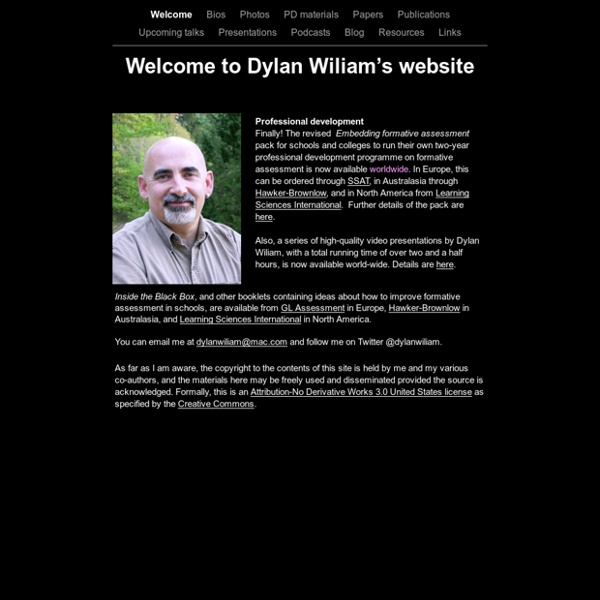



http://www.dylanwiliam.org/Dylan_Wiliams_website/Welcome.html
Related: KompetensutvecklingAssessment for Learning - OER in Education Research shows that good practice in assessment for learning can bring about significant gains in pupil attainment About. This study unit offers practical strategies that teachers can use to improve their understanding of assessment for learning. Perfect failures Rags to riches: Spanx founder Sara Blakely says failure is a key part of her business plan. Photo: The Guardian Most of us have heard the stories of Michael Jordan not making the cut for his high school basketball team, of 30-year-old Steve Jobs being fired from his own company, or Oprah being told she ''wasn't fit for television". Stories such as these are etched in the social psyche, perhaps because it is comforting to know that some of the most brilliant among us have had some super-sized blunders. And that they not only survived but thrived. Also, it is because fear of failure isn't unusual.
Technology-supported assessment Initial Author David Nicol Background and Definitions Take one sheet of paper and really get to know your pupils A one-page profile is exactly what it says on the tin. It's one page of information which has three questions. What do others like and admire about you? What is important to you? And what support do you need? We started using one-page profiles at our school four years ago because we had a year 3 class that wasn't gelling well and I wanted to find a way for the children to get to know one another, and to learn more about themselves, too. E-Guide: E-Tutoring: Designing and supporting online learning Introduction E-tutoring can be defined as teaching, support, management and assessment of students on programmes of study that involve a significant use of online technologies (TechLearn, 2000). Thus, at first glance, e-tutoring is only different to tutoring in terms of the involvement of technology. Herein, however, are contained vital differences in terms of time, distance and the specific technologies adopted, and these all have implications for teaching staff. The capabilities required can be quite different to face-to-face teaching both in terms of integrating appropriate forms of technology into learning activities and in managing and supporting students' learning online. This guidance note is aimed at teaching staff involved in designing and delivering online learning.
Genius Hour Part I This week it unfolded. Passion…geniuses…or a combination of both? We kicked off our IBPYP Exhibition these last few weeks in grade 5 at Yokohama International School. Selecting Assessment Methods Determine the optimum mixture of assessment tasks At the course level, an assessment plan that comprises several different components or tasks will increase the likelihood that students experience at least one task type that suits their preferred learning style. As a guide to planning for the optimum mixture of assessment tasks, consider a range of dimensions.
The Problem with "Personalized Learning" James Paul Gee: People who never confront challenge and frustration, who never acquire new styles of learning, and who never face failure squarely may in the end become impoverished humans. They may become forever stuck with who they are now, never growing and transforming, because they never face new experiences that have not been customized to their current needs and desires…Success in the 21st century at work and in life requires collaboration, collective intelligence, and smart teams using smart tools. In our fast-changing world, a world that faces many serious crises, being able to cope with challenge, to persist past failure, to learn in new ways, and to adapt one’s skills and style to other team members are all 21st-century skills.